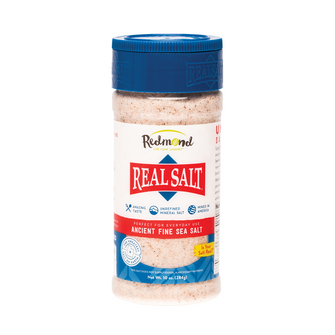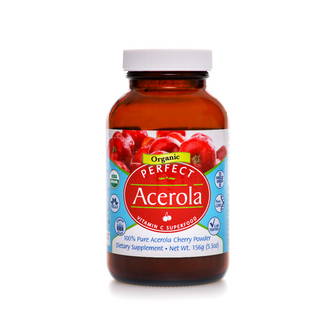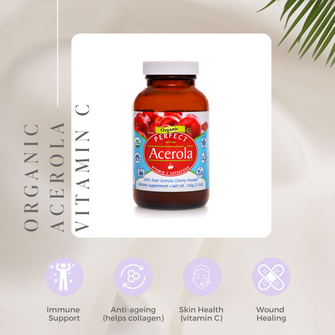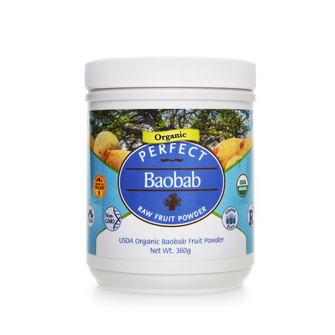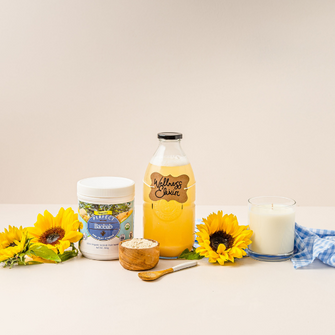Categories
Salt is not just important, it is actually VITAL to our health and the functioning of our body and it is most commonly consumed by human beings, second to water that is.
It is another food that has unfortunately been vilified and demonised and for the most part, it is still quite misunderstood 🙁
Lots of integrative and functional doctors are slowing changing this paradigm though and people are beginning to wake up to the importance of salt in their diet and we aren't talking about table salt either!
We are talking about natural salt and what makes up this life-enhancing food and that is sodium and chloride. Salt in its natural form (which we will get to soon) is as essential to life and health as water is and without it, we would perish.
Sodium chloride is a positive ion and predominantly found in extracellular body fluid, in fact, our own human plasma contains 0.9% sodium chloride (which we get from the food we eat and the beverages we consume).

How Much Salt to Have?
If you're salt intake is low (if you your intake of unnatural table salt is high), your health may suffer.
To be sufficiently "salty" the recommended minimum intake of sodium chloride (natural salt) is 1.5tsp (8g) per day! Much more than what doctors and "health experts" recommend and no wonder so many people are not well.
This is only the basic requirement so if you are sweating then you will need to increase this amount to suit.

What Happens When We Don't Get Enough?
If we don't get enough of the right type of salt, we can become deficient and many things can start to malfunction within our body as real salt is vital for healthy functioning.
Metabolism: To properly metabolise, we need to be consuming the basic requirement. That is because salt deficiency causes the body to go into a "sodium-sparing" mode to ensure that osmotic balance and acceptable blood pressure can be maintained by the circulatory system.
Inflammation: This can occur when salt-depleted as this deficiency triggers the stimulation of RAAS (renin-angiotensin-aldosterone hormonal system) and without going into all the boring science, basically this occurrence can stimulate inflammatory agents in the body.
Other damaging effects of RAAS stimulation from low sodium intake include; insulin-resistance, metabolic syndrome, cardiovascular disease, loss of cognition and more!
For more in-depth information about this, please check out Weston A Price article 'Salt and Our Health'.
Lack of Salt Can Cause (in summary):
- Headaches
- Dizziness
- Cognitive impairment
- Poor digestion
- Bloating
- Exercise intolerance
- Muscle cramps
- Insulin resistance
- Insomnia
- Chronic fatigue
- Sugar cravings
Salt and High Blood Pressure
As we age (and even as we are young), we hear such messages from TV, movies, teachers, our parents and the doctor that salt is bad, salt gives you "high blood pressure" even heart disease and stroke.
This is misinformation.
The one that area that does need caution and concern though is certain types of hypertension. If you have salt-sensitive hypertension (a genetic issue where the blood pressure actually does respond to salt) you may need to be more cautious? Not fearful ton the point of avoiding healthy salt altogether as we all need it, but just more careful with your intake.
People are given misguided advice about salt and told to consume less than 3g per day when the basic human need is for 8g!
We won't get into the political reasons why this occurs but would prefer to focus our energy on educating our customers and audience.
It really just comes down to getting the right amount and if you aren't a salt-sensitive hypertensive person, follow the recommended (correct) daily intake of 1.5tsp of natural, real salt or more of you sweat a fair amount.
Lack of Salt Can Cause:
- Headaches
- Dizziness
- Cognitive impairment
- Poor digestion
- Bloating
- Exercise intolerance
- Muscle cramps
- Insulin resistance
- Insomnia
- Chronic fatigue
- Sugar cravings

Why the Confusion around Salt?
Many folks are super confused about salt and I get it, I used to be one of them until I knew better. I now know that the iodised salt that we grew up on is unnatural and potentially hazardous for my health and that I will now only eat Celtic sea, Himalayan or Redmond Real (pink salt from Utah) and my absolute favourite!
Your doctor may use the word 'salt' but they may also use the word 'sodium' and whilst salt contains sodium, it isn't isolated as it also contains chloride and other elements as well.
Why You Should Avoid Table Salt
Table salt is the devil (as far as I'm concerned) and it should not be on anyone's dining table or in their pantry! That is because it's refined and heated to an extremely high temperature of 648.8 celsius. It goes without saying that this type of heat process is going to destroy any goodness in the salt.
Not only that though, most table salt has added chemicals and additives and many even contain sugar! If you see the word 'dextrose' in the ingredients list, then you have a salt with added sugar!
Many table salts also contain iodine (say they contain iodine but they actually contain iodide and because this evaporates rapidly, you are left with virtually none) and don't get me wrong, we think iodine is incredibly important but it is best to obtain it from the foods (proper foods) that you eat rather than medicated in a fake food like table salt.
Table salt and natural salt from the earth and the sea are completely chalk and cheese (the former being the chalk and the latter being the nutrient-dense cheese) and if you ought to be reducing any, it would be the chalk (AKA - table salt)!
Once you know this about salt, you can't unknow it and it will change your life forever!

Refined salt (table salt) as mentioned is basically a dead food as it is devoid of nutrition that natural salt contains and eating table salt can be potentially harmful to your health.
Why?
Because it is so refined (high heat process) that your body does not recognise it as anything beneficial and also because it is bleached (need we say more)?
It does not contain the life-giving minerals that real salt contains and with added dextrose (sugar) you can forget it!
Why do they add sugar to salt?
During the processing of sugar, the finished product becomes quite bitter to taste and so many companies that produce table salt, often add dextrose to make the product more palatable. It kind if reminds me of what they do to vegetable oil to make it smell edible (not add sugar but use chemicals to deodorise the oil) 🤮
Another things about consuming table salt is that it won't help with remineralisation (remember, it is devoid of goodness) and your body may actually respond negatively to this fake, imposter salt!
What about Iodine?
That is a great point and we will help to guide you to better (healthier) sources for your iodine requirements rather than consuming iodised salt in the false sense of security that you are getting your daily iodine!
Table salt that is iodised is a bit of a farce as this is not actually iodine, it's iodide and it evaporates rapidly so what is the point really?
Iodine is vital for healthy thyroid function, breast health and metabolism so let's share some healthier options for getting your iodine. Such as:
- Liver
- Pasture-raised organic eggs
- Yoghurt, milk & cheese
- Sea veggies (nori, wakame, kombu, dulse, kelp etc.)
- Bladderwrack supplements
- Shrimp, cod, oysters, tuna
- Dried prunes, bananas, strawberries
Note: organic, grass-fed and wild caught are always going to be the best options here so please keep this in mind.
How to Get More Salt into My Diet?
I think I add natural salt to just about everything - even many of my drinks!
Eggs for breakfast, a piece of fish, chicken or steak. I add it into all of my cooking and I'm always generous with it, never stingy. It's yummy in a hot chocolate, in homemade salad dressings or sprinkled over an avocado half with a drizzle of lemon juice!
One way that I like to start my day is with an adrenal cocktail as it does not wire my nerves and upset my gut and mood like coffee can.
Your Adrenals Love Salt! (and vitamin C and potassium)
We will talk more about adrenal cocktails soon but in the meantime, let me share with you my own personal adrenal cocktail that is unlike any other I've seen (as the ingredients are 100% natural and non-synthetic) and it's low cal/low-carb as I don't use orange juice in mine but rather organic Acerola cherry (as these are much higher in vitamin C than oranges).
To make this, I simply add some warm filtered water to a cup and then add a squeeze of lemon juice, 1/4 tsp of real salt (sodium chloride), 1 scoop of Perfect Organic Baobab (rich in potassium and magnesium), 1/4 tsp of Perfect Organic Acerola Cherry (high in bioavailable vitamin C).
What is Natural Salt?
Natural salt such as Celtic sea, Himalayan and Pink Salt from ancient mines in Utah (Redmond Real Salt) are the only salts that we use in our house and I highly recommend these over even some of the sea salt you find in the supermarket and that is because salt is NOT white! If it is white, it has been bleached.
Salt should be grey or pink and even black, but never white.
White salt is refined and as mentioned, chemically-treated to take the colour out.
One of the yummiest salts I have ever tasted by far, is the Pink Salt from Utah USA, there really is nothing like it in the world and it is 100% clean and safe to consume. The Redmond Real brand of Salt (Redmond Real Salt) we now are proud to stock and this salt is enjoyed by thousands of chefs and families around the world.
Make the switch to natural salt today... you'll be glad you did.
I also recommend reading the book - 'The Salt Fix: Why the Experts Got it All Wrong -- and How Eating More Might Save Your Life' by James DiNicolantonio
Resources/References:
https://www.westonaprice.org/health-topics/abcs-of-nutrition/salt-and-our-health/
https://healthwholeness.com/nutrition/iodine-rich-foods/
https://redmond.life/blogs/live-your-journey/do-you-really-need-to-hold-the-salt-to-stay-healthy
https://www.drnorthrup.com/why-you-need-salt-in-your-diet/
https://www.amazon.com/gp/product/0451496965?tag=randohouseinc17103-20
Disclaimer: These are only potential benefits. This article is purely intended for informational purposes and not as advice. One must seek proper professional advice from their trusted health practitioner.


